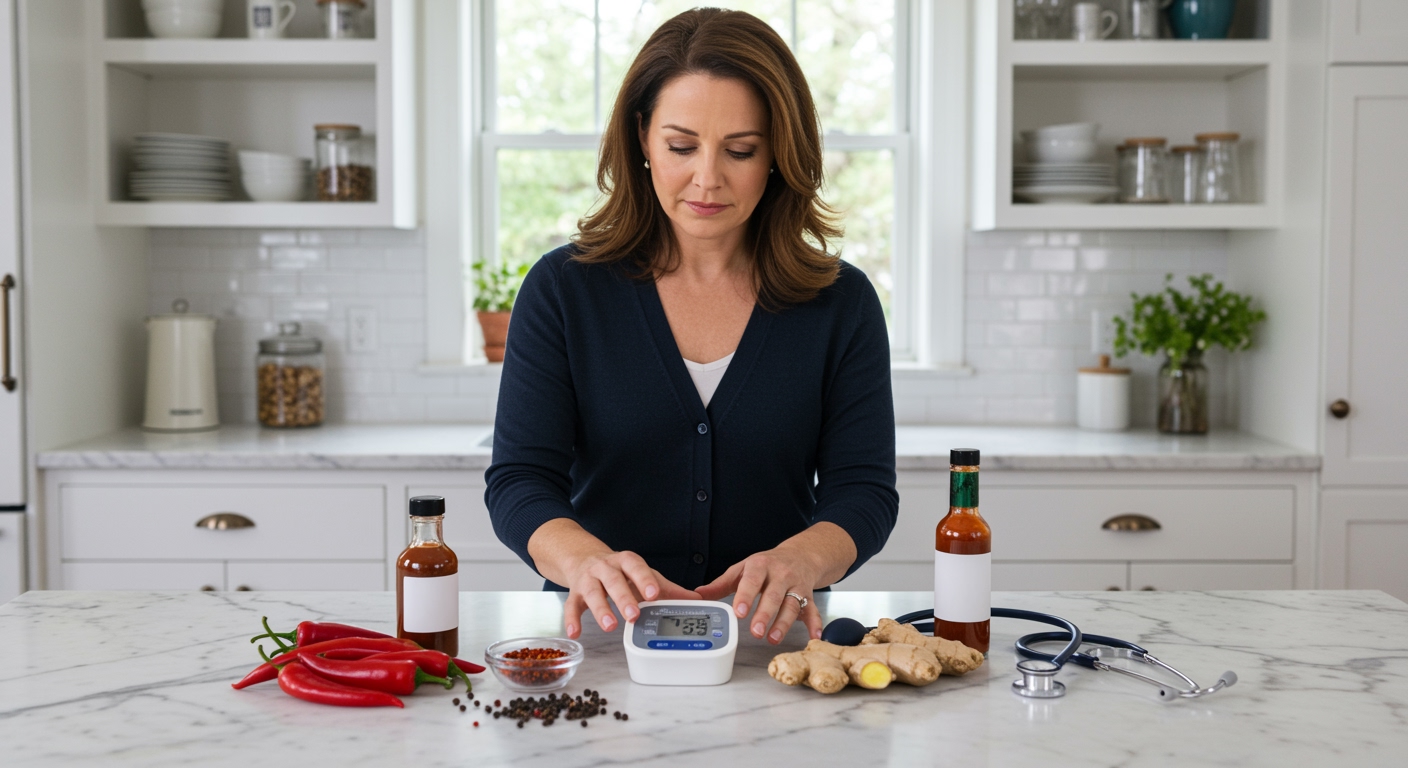✪ Key Takeaway: Hypotension patients can safely enjoy spicy foods as they may actually help improve blood pressure regulation.
Introduction
Your doctor tells you to avoid spicy foods because of your low blood pressure, but you love the kick of hot peppers and wonder if this advice makes sense.
Many people with hypotension receive conflicting information about spicy foods, leaving them confused about whether these flavorful additions help or harm their condition.
Hi, I’m Abdur, your nutrition coach, and today I’m going to explain the real relationship between spicy foods and low blood pressure based on current research.
What Actually Happens When You Eat Spicy Foods?
Spicy foods contain compounds called capsaicinoids, primarily found in chili peppers, which create that burning sensation you feel in your mouth.
When capsaicin enters your system, it binds to TRPV1 receptors in your mouth, throat, and digestive tract, sending signals to your brain about heat and pain.
Your body responds to this perceived threat by releasing endorphins and activating your sympathetic nervous system, which controls your fight-or-flight response.
This activation causes temporary changes in your heart rate, breathing, and yes, your blood pressure.
However, the initial spike in blood pressure from eating spicy foods is usually brief and followed by a longer period of relaxation in your blood vessels.
✪ Fact: Capsaicin can remain active in your system for up to 24 hours after consumption.
Do Spicy Foods Lower or Raise Blood Pressure?
Research shows that regular consumption of spicy foods may actually help lower blood pressure over time, not raise it.
A study published in the journal Hypertension found that people who ate spicy foods regularly had lower systolic and diastolic blood pressure readings compared to those who avoided them.
The mechanism behind this effect involves capsaicin promoting the release of nitric oxide, a compound that helps relax and widen your blood vessels.
Additionally, spicy foods may reduce your desire for salt, which is a major contributor to high blood pressure and can worsen hypotension symptoms when consumed in excess.
The temporary increase in blood pressure immediately after eating spicy food is actually beneficial for people with hypotension, as it provides a gentle, natural boost.
This effect is similar to how a cup of coffee can temporarily raise blood pressure, which many doctors recommend for hypotension patients.
✪ Pro Tip: Start with mild spices and gradually increase heat levels to allow your body to adapt.
Are There Any Risks for Hypotension Patients?
Most hypotension patients can safely enjoy spicy foods without experiencing negative effects on their blood pressure.
However, some individuals may experience digestive discomfort, sweating, or temporary dizziness immediately after consuming very spicy foods.
These symptoms are usually related to your body’s natural response to capsaicin rather than dangerous changes in blood pressure.
If you have severe hypotension or take medications for blood pressure, you should monitor your response to spicy foods and consult with your healthcare provider.
People with certain digestive conditions like gastritis or acid reflux may need to limit spicy foods, but this is unrelated to blood pressure concerns.
The key is starting slowly and paying attention to how your body responds to different levels of spiciness.
✪ Note: Keep a food diary to track your blood pressure response to different spicy foods.
Which Spicy Foods Work Best for Low Blood Pressure?
Not all spicy foods are created equal when it comes to their effects on blood pressure.
Fresh chili peppers, cayenne pepper, and paprika contain higher levels of capsaicin and provide the most cardiovascular benefits.
Ginger and black pepper offer different compounds that can also support healthy circulation and blood flow.
Garlic, while not technically spicy, provides similar vasodilating effects and pairs well with spicy ingredients in cooking.
Avoid processed spicy foods that are high in sodium, as excess salt can worsen hypotension symptoms and counteract the benefits of capsaicin.
Fresh or dried whole spices are always better choices than pre-made spice blends that often contain added preservatives and salt.
✪ Pro Tip: Add fresh chili peppers to your morning eggs for a natural blood pressure boost.
The Bottom Line
Hypotension patients do not need to avoid spicy foods and may actually benefit from including them in their diet regularly.
Smart nutrition choices support your body’s natural ability to regulate blood pressure without relying solely on medications.
I would love to hear about your experiences with spicy foods and blood pressure in the comments below, so please share your questions or feedback.
References
At NutritionCrown, we use quality and credible sources to ensure our content is accurate and trustworthy. Below are the sources referenced in creating this article:
- PMC: Spicy Food Consumption and Blood Pressure
- Cardiovascular Business: Spicy Food May Suppress Cravings for Salt
- Scripps Health: Spicy Food May Lower Blood Pressure
- Ohio State University: Eating Spicy Food Health Benefits





